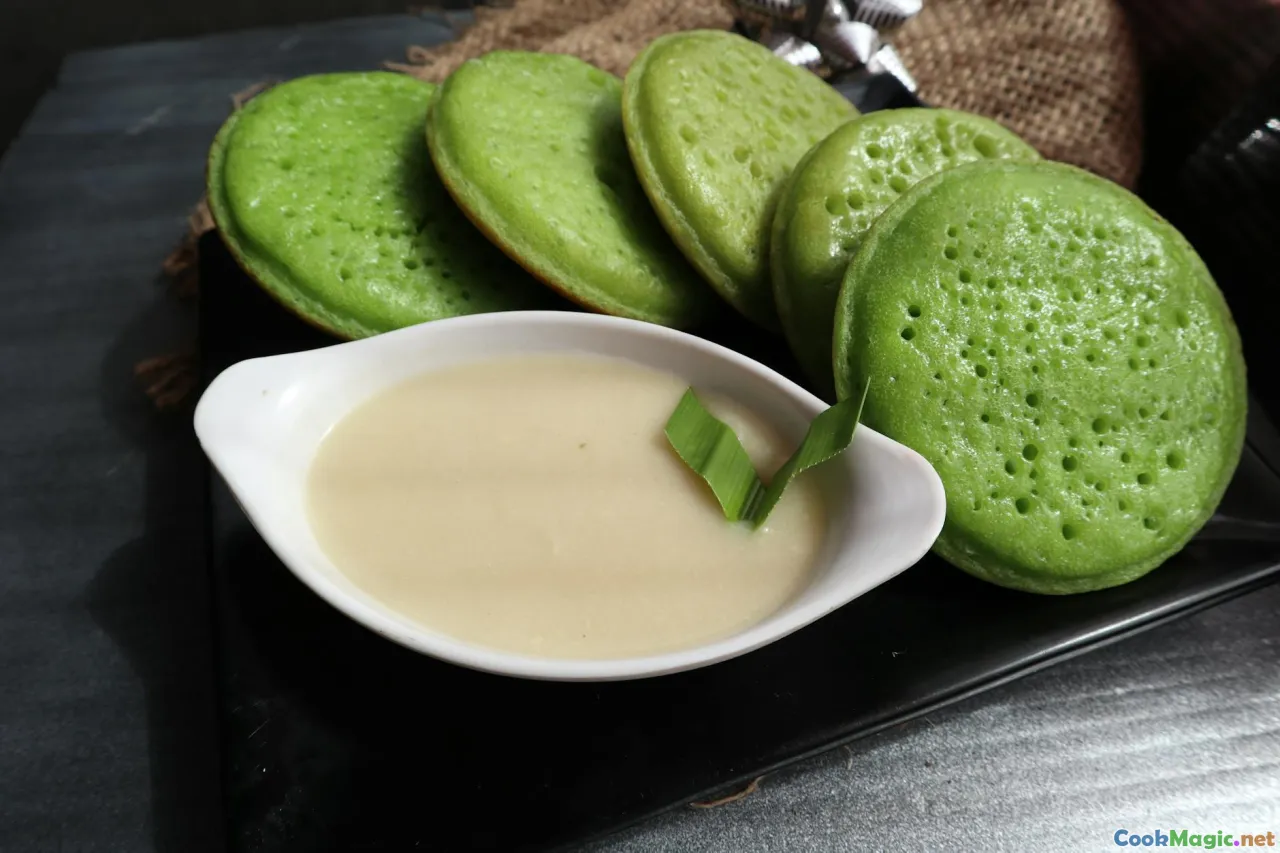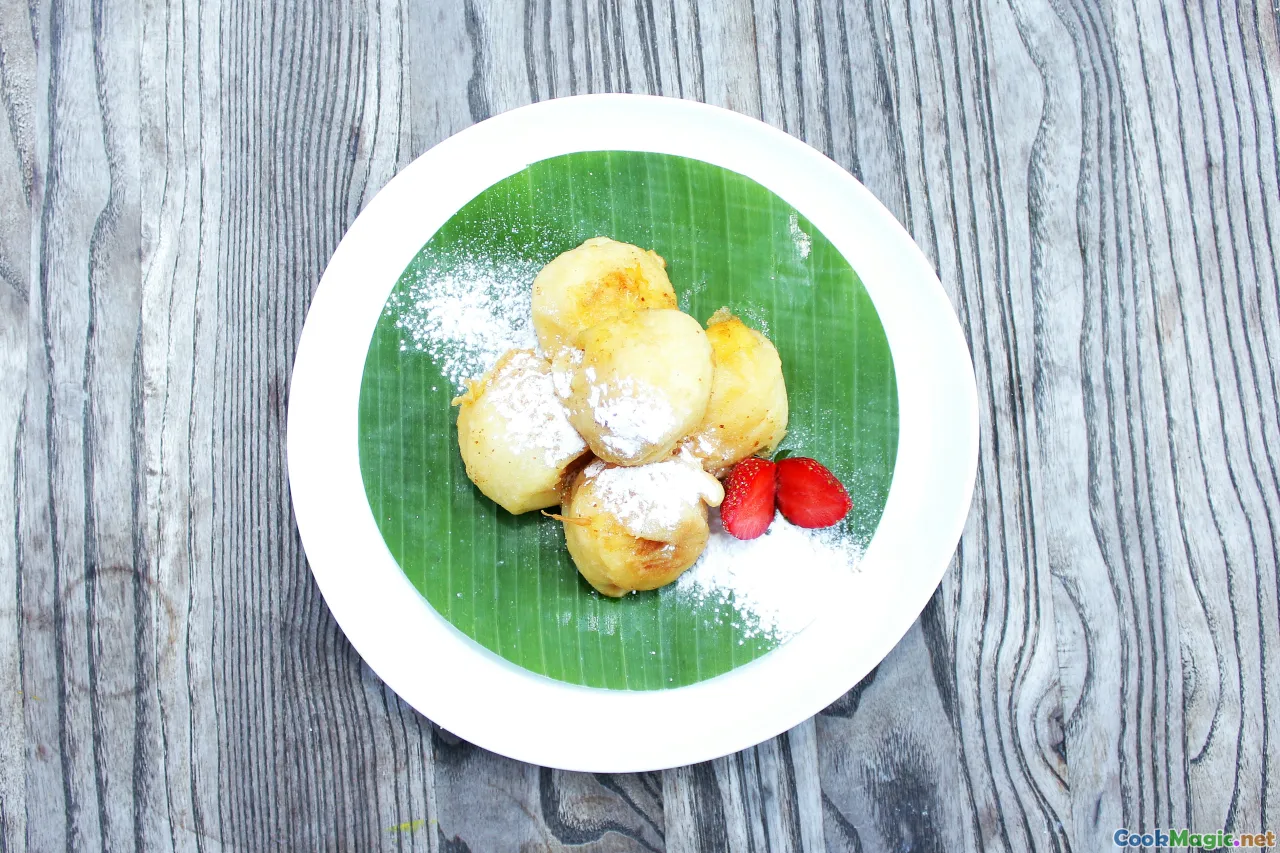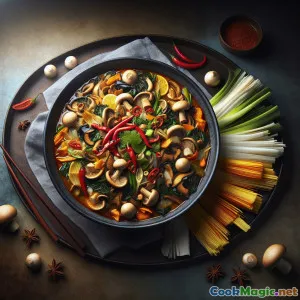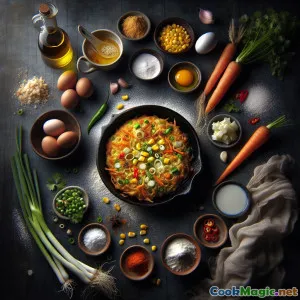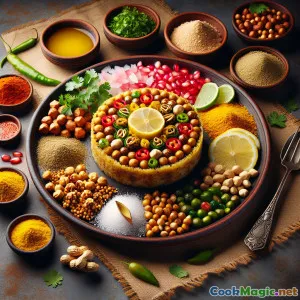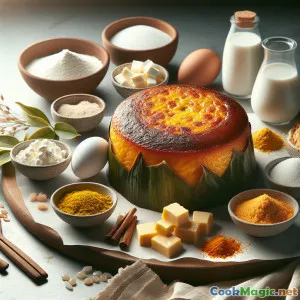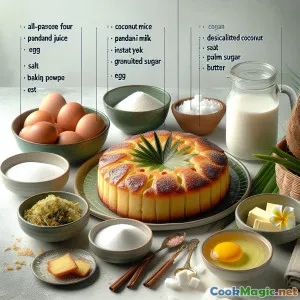
Serabi Solo Pandan – Crêpe moelleux à la noix de coco et pandan
(Serabi Solo Pandan – Fluffy Pandan Coconut Pancake)
(0 Avis)0
352
septembre 28, 2025
Signaler un problème
Ingrédients
-
150 grams Farine tout usage
(Provides main structure for pancakes)
-
150 ml Jus de pandan
(Fresh pandan leaves blended with water; substitute with pandan extract if unavailable)
-
250 ml Lait de coco
(Use thick, canned coconut milk for richer flavor)
-
1 tsp Levure instantanée
(Leavening agent for soft texture)
-
60 grams Sucre granulé
(Adds sweetness to the batter)
-
1 large Œuf
(Binds and enriches the batter)
-
1/4 tsp Sel
(Équilibre des saveurs)
-
1/2 tsp Poudre à lever
(Extra leavening for fluffiness)
-
2 tbsp Noix de coco râpée
(Sprinkled as a garnish)
-
70 grams Sucre de palme
(Traditionally spread on top, use brown sugar if needed)
-
1 tbsp Beurre
(Graisser le moule)
(Provides main structure for pancakes)
(Fresh pandan leaves blended with water; substitute with pandan extract if unavailable)
(Use thick, canned coconut milk for richer flavor)
(Leavening agent for soft texture)
(Adds sweetness to the batter)
(Binds and enriches the batter)
(Équilibre des saveurs)
(Extra leavening for fluffiness)
(Sprinkled as a garnish)
(Traditionally spread on top, use brown sugar if needed)
(Graisser le moule)
Nutrition
- Portions: 4
- Taille de portion: 2 small pancakes (around 180g)
- Calories: 378 kcal
- Carbohydrates: 0 g
- Protein: 6 g
- Fat: 15 g
- Fiber: 3 g
- Sugar: 14 g
- Sodium: 212 mg
- Cholesterol: 38 mg
- Calcium: 43 mg
- Iron: 1.7 mg
Instructions
-
1 - Prepare Pandan Juice:
Blend 8 pandan leaves with 180ml water, then strain to extract 150ml vibrant green pandan juice. Substitute with water + 1 tsp pandan extract if needed.
-
2 - Mix Yeast Base:
In a bowl, combine warm coconut milk (100ml), instant yeast, and 1 tsp sugar. Stir and let sit 5 minutes until foamy.
-
3 - Make Batter:
In a large bowl, whisk flour, remaining sugar, salt, and baking powder. Add egg, pandan juice, and yeast-coconut mixture. Mix to smooth, pourable batter.
-
4 - Rest the Batter:
Cover the bowl and let the batter ferment in a warm place for 20 minutes for fluffy, airy results.
-
5 - Heat Pan & Cook Pancakes:
Heat a non-stick mini-pan or skillet over low. Grease lightly with butter. Pour in a small ladleful for each pancake. Cook 3-4 mins until bubbly, soft and edges firm. Cover with lid to steam. Do not flip.
-
6 - Add Creamy Coconut:
Optional: Drizzle some coconut milk over each partly-cooked surface before removing from heat for a creamy finish.
-
7 - Serve and Garnish:
Transfer serabi to plate. Optionally sprinkle with desiccated coconut or grated palm sugar. Serve warm as breakfast or delicious snack.
Blend 8 pandan leaves with 180ml water, then strain to extract 150ml vibrant green pandan juice. Substitute with water + 1 tsp pandan extract if needed.
In a bowl, combine warm coconut milk (100ml), instant yeast, and 1 tsp sugar. Stir and let sit 5 minutes until foamy.
In a large bowl, whisk flour, remaining sugar, salt, and baking powder. Add egg, pandan juice, and yeast-coconut mixture. Mix to smooth, pourable batter.
Cover the bowl and let the batter ferment in a warm place for 20 minutes for fluffy, airy results.
Heat a non-stick mini-pan or skillet over low. Grease lightly with butter. Pour in a small ladleful for each pancake. Cook 3-4 mins until bubbly, soft and edges firm. Cover with lid to steam. Do not flip.
Optional: Drizzle some coconut milk over each partly-cooked surface before removing from heat for a creamy finish.
Transfer serabi to plate. Optionally sprinkle with desiccated coconut or grated palm sugar. Serve warm as breakfast or delicious snack.
En savoir plus sur: Serabi Solo Pandan – Crêpe moelleux à la noix de coco et pandan
Serabi Solo Pandan: Green Pancake with Heart & Heritage
Serabi is one of Indonesia's most beloved traditional dishes, especially popular in the Central Javanese city of Solo (Surakarta). Its distinctive look—a delicate, fluffy pancake infused with natural-green, aromatic pandan leaf extract and topped with rich coconut cream or melted palm sugar—intrigues both locals and visiting food lovers alike. The version from Solo (‘Serabi Solo’) is especially admired for its thin, lace-like fringes and buttery-soft middle, making it both uniquely beautiful and texturally delightful.
Historical & Cultural Backdrop
Pandan, with its grassy, floral vanilla scent, is treasured in Southeast Asian kitchens. In Indonesia, pandan is more than just a flavor; it represents festivity and tradition. The technique of blending fresh pandan leaves to make aromatic juice is an age-old method that vividly hues serabi a brilliant green—a symbol of freshness. The use of yeast in the batter is what gives the classic Serabi its prized fluffiness and mild tang, characteristic of well-fermented pancakes resembling crumpets. The pancakes’ origins also reflect the syncretic blend of trade influences in Central Javanese kingdoms, with coconut, local palm sugar, and rice flour often mixed in creative reinterpretations.
Serabi is not only a breakfast or snack but also plays a role in social gatherings. Sold in morning markets and during evening street fairs, it's a treat meant for sharing—a staple enjoyed across generations at all times of day. In Solo, tiny storefronts or streetside vendors pour and spread their batter masterfully, with each serabi made fresh to order, sometimes stretching through the night for enthusiastic crowds.
Making Your Own Serabi Solo Pandan
When making serabi at home, using fresh pandan juice miraculously scents and colors your house while also ethically honoring tradition. For the batter, yeast achieves the famed softness—let it ferment for best result. Adding a bit of baking powder is a modern tip for even quicker, consistently airy results.
Instead of constant busy market atmospheres, home-cooked Serabi invites room for creativity. Drizzle coconut cream just as serabi Lady Street Chefs do, or go nontraditional with chocolate or fruit toppings. While Serabi originally used terracotta woks over charcoal, a nonstick skillet works excellently—don’t forget to slow-cook and cover for the moistest texture!
Tips for Perfect Pancakes
- Pandan extract substitute: If you can’t access fresh pandan, most Asian supermarkets carry natural pandan paste. Just use a tiny amount—it's potent!
- Fermentation: Don’t skip this step. The rest produces air bubbles for fluffier cakes.
- Keeping your pan at low temperature: High heat risks browning too fast before inside is cooked. Steaming under a lid is the secret for the iconic chewy softness and airy crumpet-like holes.
- Serving Suggestions: Try grating caramelized palm sugar on top for an authentic Solo street vibe, or drizzle sweetened coconut milk for luscious creaminess.
Personal Notes
Serabi Solo Pandan isn’t just a recipe—it’s a sensory escapade through the vibrant colors, smells, and community spirit of Javanese tradition. Recreating it means immersing yourself in Indonesian culture, bustling markets, and warm conversations by the food stand. Offer it fresh from your own kitchen, and you’ll experience how food, in all its green-and-white beauty, brings generations and friends together.
Selamat mencoba! (Happy trying!)

